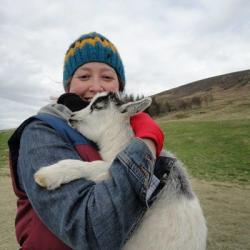Bloodhoof By Gerður Kristný, Translated By Rory McTurk
Gerður Krístný is an immensely prolific writer, having produced some 18 books—including poetry and short story collections, novels for adults and children, a biography and a travel narrative—since her first publication in 1994. However, she is as of yet relatively unknown to English-reading audiences. For although several international collections have anthologised her poems and short stories, it was not until Gerður won the Icelandic Literature Prize in 2010 that one of her works, the winning poetry book ‘Bloodhoof,’ was translated into English in its entirety.
“I feel as though I have been writing ‘Bloodhoof’ since I was a child,” Gerður has stated, explaining that as a girl she was fascinated by Norse mythology. In fact, the first verse that she ever composed was about Odin, the ruler of the Æsir gods. In ‘Bloodhoof,’ she turns her attention to a well-known mythological episode in which the servant Skírnir travels across worlds to fetch a beautiful Jötunn maiden (also named Gerður) and bring her to the god Freyr, who has fallen in love with her from afar.
‘Bloodhoof’s’ long-form retelling draws its inspiration from the ‘Skírnismál,’ (‘The Lay of Skírnir’). “This story has always been considered a romantic and beautiful story,” she explained. “But actually it is full of violence.” Indeed, Gerður’s spare retelling leaves no room for idyllic interpretations—no glossing over of the fact that in the ‘Skírnismál,’ the woman only agrees to go to Freyr under great duress—only, in fact, after he has threatened to kill her kinsmen and place a curse on her: “Over my head / the sword sang a song / the song of a maiden / who struggles / and dies / her neck decked with a slash.”
The poem’s deliberate pacing and stark imagery is emphasised by its layout: there is no more than a stanza on each page, sometimes no more than a few lines. Given the rhythmic alliteration of the poem in its original Icelandic (which often reflects the ljóðaháttur, or chant metre, of the ‘Skírnismál’), it is also particularly nice to see both the Icelandic and English text on the same page, as even readers who do not understand Icelandic will be able to get a feel for the sound of the original as they read along.
As translator Rory McTurk points out in his useful contextual introduction, “Bloodhoof” finally allows Gerður her own voice—the poem is told entirely from her perspective—where in ‘Skírnismál,’ she only speaks eight stanzas of 42. Additionally, both Eddic versions of Gerður’s story end with her promise to come to Freyr in nine night’s time, but neither actually relate the pair’s meeting. ‘Bloodhoof,’ on the other hand, uses this first meeting as a jumping-off point, as merely the start of Gerður’s nightmare of abuse:
He wrapped
my hair
around his hand
and led meaway
…
Freyr’s paws
pawed mereducing me
to terrorscored
a new scar
on my skin each night
These passages of violence in ‘Bloodhoof’ resonate particularly for being wholly unvarnished and direct. It is also important to note that this is not the first time that Gerður Kristný has written about these mythological figures. In fact, her first poetry collection includes a poem entitled “Til Skírnis” (‘To Skírnir’). Also narrated by Gerður, “Til Skírnis” ends with awful finality, on the lines “Dauðan lít ég svip minn / í sverði þínu,” (literally: “Dead I see my face / in your sword”).
This line is quoted almost verbatim in ‘Bloodhoof’: “Dauðan leit ég / svip minn / í sverði drengsins,” which Rory has rendered as “I saw my face, / dead, reflected / in the envoy’s sword.” But in this echo, the line appears only half way through the book. And while great suffering follows the statement, so does great strength and resurrection:
Yet the body
holds
its ownThe body
holds
firmThe body
holds…
with a foot stuck fast
under a chaira hand
in the far cornerfingers all over the floor
I gathered myself
into one piecealigned my eyebrows
set my jaw
tucked in my liver and lungspressed my heart
into service
Until eventually, Gerður rises to meet her oppressor: “In the doorway / I met Freyr / He saw his face, / dead, reflected / in my eye.” Still awaiting the vengeance of her kinsmen, Gerður has nevertheless freed herself in spirit, if not yet in body.
Buy subscriptions, t-shirts and more from our shop right here!
















